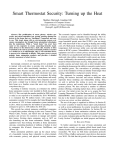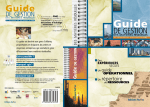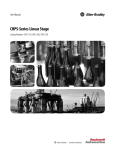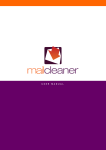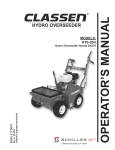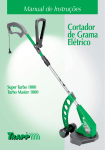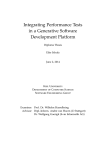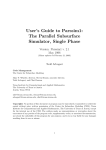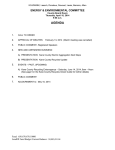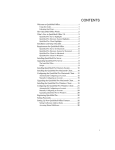Download Spartan Village User`s Manual
Transcript
Spartan Village is a new expansion to UNCG’s oncampus housing, comprised of four buildings that house undergraduate students in full size apartments. When completed, the first phase will provide 804 beds as well as mixed-use retail and office space. Spartan Village also houses a Living-Learning Community (LLC) which is open to students who desire to enroll in courses with and live among their learning community peers, and participate in related co-curricular programs. The UNCG community recognizes the need for sustainable practices and has initiated a climate action plan to attempt to achieve climate neutrality by the year 2050. Spartan Village has been built with this in mind, and an important goal of the construction of Spartan Village is to receive Leadership in Energy and Environmental Design (LEED) Silver certification. LEED is an internationally recognized designation developed by the U.S Green Building Council. Sustainable features that were incorporated into the design of Spartan Village include: • HIGH-EFFICIENCY HEAT PUMPS to reduce the amount of electricity used in heating; • INDOOR BIKE STORAGE to promote sustainable transportation; • LOW VOC PAINTS to minimize the release of harmful toxins into the atmosphere; • LOCAL FURNITURE VENDORS AND LOCAL CONSTRUCTION MATERIALS; • 18 SEER HIGH-EFFICIENCY EQUIPMENT; • OUTSIDE AIR SYSTEMS to all the units and common spaces; • SOLAR PANELS are intended to be installed at Spartan Village in the future for solar water heating. sv booklet.indd 1 The Spartan Village USER’S MANUAL Welcome Home! This guide was revised and edited for Spartan Village by Jessica Straehle, a UNCG student in the Business Administration and Environmental Studies programs. It was originally created by Tia Arbogast, a UNCG student in the Environmental Studies program, with assistance from the Office of Sustainability and from Housing and Residence Life. 10/14/2013 11:03:08 AM green components To access apartment options, floor plans, amenities, and photos for Spartan Village, please visit the following link: http://hrl.uncg.edu/living_on_campus/halls2/spartan/spartan.php Natural Light Low Glare Sidewalks Natural light is utilized in study rooms, laundry rooms, and corridors. These community spaces are also controlled by occupancy sensors. These sensors detect if anyone is in the room; if no one is present, they prevent the interior lights from turning on until the room is occupied. b Low glare sidewalks were installed which also reduce the Thermostats Exhaust Systems Your suite is equipped with a digital thermostat. b To help maximize energy efficiency, the temperatures should be set at 68°F throughout the cooler months and 74°F or higher throughout the warmer months. b You will find more information on how to operate your thermostat on page 4 of this manual. Heat Island effect by reflecting light from the sun in order to prevent the trapping of heat. b Americans, on average, spend 90% of their time indoors and indoor air pollutant levels are often several times higher than in outdoor air, which makes the circulation of fresh air essential. In order to provide continuous fresh air, special exhaust systems have been installed in your building that draw air out of the building through exhaust vents in the bathrooms, while bringing fresh air in via supply vents. Insulated Windows and Doors b Your windows and doors are insulated with spray foam insulation to help maintain energy efficiency. Without insulation, the air temperature inside a building would be greatly affected by the outside temperature, thus increasing energy demands as the building works harder to maintain a constant temperature. As a new resident of Spartan Village, you may not be familiar with some of the technology of your building, which is why this user’s manual has been created. In this manual you will find information that will familiarize you with the sustainable features of your building, explain how to use and interact with this technology, and also introduce you to methods of living sustainably. It is important to note that the building will be more comfortable and efficient if you understand how to use it properly. Specific actions you can take to reduce your personal carbon footprint will be marked with this symbol: sv booklet.indd 2 10/14/2013 11:03:10 AM Thermoplastic Roofing Membrane Heat Island describes metropolitan areas that are hotter than nearby rural areas, mainly due to the use of materials that retain heat. The annual mean air temperature of a city with >1 million people can be 1.8°F to 22°F warmer than its surroundings. b To reduce UNCG’s contribution to Greensboro’s Heat Island, white thermo-plastic (TPO) roofing membranes have been installed on portions of the Spartan Village building rooftops. The white color of the TPO roof reflects heat from the sun, reducing the amount of heat absorbed by Spartan Village. Low VOC products Volatile Organic Compounds (VOCs) are contained in and are emitted from products used to finish or furnish rooms, including paints, fabrics, and adhesives, which may have adverse health effects. VOCs have an odor, for example, that “new car smell” comes from VOCs. Adverse health effects from exposure to VOCs can include: eye, nose and throat irritation, nausea, headaches, and possibly cancer. b The furnishings, paints, and adhesives in your building contain lower level or no VOCs. Your building comes installed with carpet that has a minimum of 35% pre-consumer recycled content. b Refurbished mattresses were purchased for Spartan Village from Mattress-Go-Round, a local company that uses recycled mattress springs along with all new fillers and covers to create a sustainable product. b By working with Mattress-Go-Round, UNCG has successfully kept over 2,400 mattresses out of the landfill! 80% of the construction waste generated from the development of Spartan Village! b During construction, biodiesel vehicles were used for transportation to and from the construction site. Biodiesel is an alternative and sustainable fuel to gasoline. For more information about biodiesel fuel, please visit http://www.biodiesel.org/ b A third party has been hired to Low Flow Water Fixtures b UNCG has installed low flow toilets, faucets, and showerheads throughout your building to help reduce water consumption. The toilets are 1.28 gallon per flush (GPF) systems vs. the 4 GPF systems of traditional toilets. The faucets are .5 gallon per minute fixtures vs. 2.2 gallons per minute and the showerheads are 1.5 gallon per minute fixtures vs. over 4 gallons per minute of older versions. sv booklet.indd 3 b UNCG successfully recycled over For more information about VOCs, please visit the Environmental Protection Agency website at http://www.epa.gov/ iaq/voc.html Recycled Carpet Backing and Mattresses b Sustainable Construction Process verify that Spartan Village was built to sustainable standards and is operating as efficiently as designed. This process is known as commissioning the buildings. b Following the completion of Spartan Village, irrigation may continue for up to one year, however, there is no permanent irrigation system in place in Spartan Village, which allows for a reduction of water consumption. b The plant material chosen for Spartan Village is drought tolerant and low maintenance. b The grass that you see in Spartan Village is zoysia, a warm-season grass. This grass is adaptable to various climates and will survive through the summer without irrigation. UNCG Office of Sustainability Building User’s Manual for Spartan Village 3 10/14/2013 11:03:11 AM G Your Room How to Help b Please turn off all lights before exiting There are also other ways to reduce energy consumption with your help: your room. b When natural lighting is available, consider avoiding the light switch altogether to save energy. b Here are some operating tips for your thermostat: • Press the up or down arrow buttons on the far right to adjust the temperature setting, which will be shown on the screen. • Press the System & Fan button to select fan operation (On: keeps the fan on, Auto: fan is only on when heating or cooling systems run) or System Type (Heat, Cool, Off, or Emergency Heat). • Use the Schedule button to set a temperature program schedule for when you wake up, leave home, return home, and go to bed. • The Clock & More button allows you to set the clock. *If the screen backlight is off, the first press of a button will only activate the backlight; the button will need to be pressed again. *More instructions for the thermostat can be found at: https://customer. honeywell.com/resources/techlit/ TechLitDocuments/69-0000s/69-26 b During cooler months, keep in mind that 68°F is the recommended setting for energy savings, and during warmer months, 74°F or higher is the desired setting. Although you are not required to maintain these exact temperatures, the closer you are to these settings, the more energy we save, and the more our community benefits. sv booklet.indd 4 b Take the stairs instead of the elevator. This not only eliminates energy needed to move the elevator, but it also helps you stay in shape. Waste and Recycling In Spartan Village, all trash and recyclables must be deposited into their respective bins in the trash rooms located throughout the buildings. Monday through Friday, Housing and Residence Life will be collecting the waste and will need your help as a resident to ensure proper waste disposal. Here’s what you can do to help: b A blue recycling bag will be available b Unplug appliances and electronics when not in use, or otherwise use a smart power strip to reduce vampire energy. Vampire energy is the electricity devices use when not “on,” but are in standby mode (think about all those tiny lights and clocks on your DVD player, stereo, TV, etc.). b Use a drying rack or clothesline instead of a dryer. b Set your computer to sleep or hibernate when not in use for short periods, and shut it down when it won’t be used for more than two hours. for pick-up during check-in. Please contact Ben, our Recycling Operations supervisor, at (336) 334-5192 if you did not receive a recycling bag. The bags are to be returned at the end of the semester. b There are several reasons why using this bag helps make proper waste disposal easy in Spartan Village: • It makes waste disposal more efficient, as your recyclables will already be separated from your trash. • There is a commingled recycling guide on your recycling bag, to let you know what can be recycled. Please remember to place the correct items in the proper recycling bins. • You are able to reuse your recycling bag. You can wash it with a load of laundry. However, please DO NOT PLACE YOUR BAG IN THE DRYER as it will melt! Air-dry it instead. • You CANNOT recycle these items at UNCG: Food • Tissue Paper Plastic Bags • Styrofoam Aluminum Foil • Please break down cardboard before placing it in the recycling bin.* • All electronic waste including batteries, CDs, diskettes, DVDs, peripherals laptops, cell phones, computers, etc. should be brought to the information desk in the clubhouse located in the Haywood building. *If you have further questions regarding recycling or waste disposal at UNCG, a number has been provided for you on the bag or you can visit: http://facrecycling. uncg.edu/ for more information. 10/14/2013 11:03:11 AM green Building Transportation Options Believe it or not, you don’t need a car to enjoy your time at UNCG! Several alternative transportation options are available to you both on and off campus, which are free or relatively cheap, and produce fewer or no pollutants compared to cars: b Walking is the least expensive and easiest option. UNCG is an easy campus to get around by foot, and the restaurants on Tate Street, Walgreens on Spring Garden, as well as other shops on Spring Garden are within walking distance. b Cycling: UNCG currently has a bronze ranking as a Bicycle Friendly University by the League of American Bicyclists! To achieve this, UNCG has made the campus safe and accessible for cyclists with: • More bike racks • Bike lanes and trails to all destinations on campus • Classes on bike repair and safety • Bike rental program • Opportunities for off-campus recreation and shopping within comfortable biking distance • Free bicycle registration • Discounts at several local cycling shops. b Public Transit: As a UNCG student, you get free and unlimited access to Greensboro’s public transit (GTA and HEAT buses). As a resident of Spartan Village, you will be able to take UNCG (Spartan Chariot) and public transportation to and from campus from an easily accessible bus stop located in the transportation hub. Need to travel a longer distance? For travel beyond Greensboro, consider taking the train. The AMTRAK station is located in downtown Greensboro, within walking distance of UNCG. � UNCG has also partnered with a carshare company called Zipcar, which is available to all eligible students. Zipcar allows you to use a car when you need one without the burdens of having to pay for insurance, maintenance, parking, and more. • For more information on the Zipcar program, please visit www.zipcar. com/uncg • For more information on the Zimride program, please visit http://zimride. uncg.edu Carpooling and Car-share: Your friend has a car and you are going to the same place - why not carpool? UNCG has a program called Zimride that can help you find carpooling options. For general information about transportation on campus, you can visit the Parking Options and Campus Access Management website at http://parking. uncg.edu/ UNCG Office of Sustainability Building User’s Manual for Spartan Village sv booklet.indd 5 5 10/14/2013 11:03:13 AM G Sustainability Tips Water Consumption It is very important to reduce water consumption not only on campus, but everywhere! Take a look at these statistics: b In the 2010-2011 school year, UNCG spent almost $1,000,000 on water! b With a focus on sustainable practices including the implementation of new low-flow fixtures, faucet aerators, preventive maintenance, water efficient appliances, and campus outreach, in 2012, UNCG was able to reduce that amount by almost 25%, spending approximately $750,000. b Campus residents are encouraged to help reduce water consumption to save costs and to help conserve water. Graph depicts annual UNCG water consumption from 2002-2012. Source: UNCG Climate Action Plan Tips for water conservation: b Take shorter showers or use cooler water while showering for energy and water savings. b DON’T run the faucet while brushing your teeth. Wait until you finish brushing to turn on the water needed for rinsing. Gentlemen, follow a similar pattern for shaving. This can save over 3,000 gallons of water per year! b Avoid using excessive amounts of water while washing your dishes. Wet all of your dishes with water, turn off the faucet to scrub them, and then rinse the dishes. b Be sure to run the dishwasher only when it is full. sv booklet.indd 6 10/14/2013 11:03:14 AM Green Building Purchases Smoking Policy What you buy is another important part of sustainable living! There are some considerations you should make before purchasing certain items if you are interested in living sustainably: b Smoking is not permitted within 25 b What kind of material has been used to package your potential new purchase? If it consists of Styrofoam, plastic wrap, packing materials such as popcorn or other materials that cannot be reused or recycled on campus, consider a more sustainable purchase option. b Avoid excessive product consumption by asking yourself, “Do I actually need this?” Not only could this lead to great environmental decisions, but great financial decisions as well! b Consider the useful life of the product. Is it renewable? Consider how long the product will last and what you will do with your purchase once it has worn out. b Buy local, organic, and in-season food and produce. • Buying locally reduces the use of natural resources required for transportation. • Organic food ensures the health of both you and the environment by reducing the overall use of pesticides, herbicides, and other harmful chemicals. • In-season produce is both delicious and great for the environment, as it limits the use of preservatives and chemicals needed to elongate the shelf life of the food. You can also consult the Food Resources for Guilford County, NC guide compiled by the Food Policy Think Tank at UNCG for local food stores, programs and services at: http://www.uncg.edu/aas/uncg_gardens/ pdf_files/Food_Resource_Guide.pdf b Using Reusable shopping bags can help you avoid contributing to environmental problems such as millions of plastic bags and bottles in our oceans and terrestrial environments. Reusable bags can be purchased at little or no cost or just use your backpack! sv booklet.indd 7 feet of ANY UNCG building. Smoking in close proximity to buildings reduces air quality for occupants. b Please don’t throw cigarette butts on the ground - cigarette butts take years to decompose because of the fiberglass make-up of the filter. Please dispose of the cigarette butts in the cigarette disposal bins that UNCG provides in many areas around campus and help keep our campus and our environment clean. Junk Mail Tired of junk mail? Help reduce waste and remove your name from junk mail and catalog lists: • https://www.dmachoice.org/ • http://www.ecocycle.org/junkmail/ index.cfm • http://www.41pounds.org/ FIXT General maintenance of your suite is provided through FIXT. Should you need service or notice any energy or water wasting conditions, you can contact FIXT through an online work order or call 334FIXT. For more information about FIXT, please visit the UNCG Housing and Residence Life webpage at http://hrl.uncg.edu Laundry facilities b There is a common laundry area on the 2nd floor of each building in Spartan Village with washing and drying machines. All laundry machines in Spartan Village are water and energy efficient, as established through the Energy Star rating system. Laundry facilities can have major impacts on water and energy consumption. Consider taking advantage of the following green laundry tips: b Use green laundry products. Avoid bleach and look for phosphate-free, readily biodegradable products. b Wash clothes in cold water, including whites – with today’s detergents, they will be perfectly clean. b Fill the washer and dryer to capacity to reduce the total number of loads. If you don’t have a full load, share with a friend! b Consider hanging your clothes on a line or drying rack in your room. Although your drying units are energy efficient, hanging your clothes to dry saves even more energy! b Clean the dryer filter before each use to allow the dryer to operate at its highest efficiency. (If the lint filter is full of lint, moist air cannot easily be vented from the dryer, thus requiring a longer dry time). b When using the dryer, make sure to dry similar fabrics together as different fabrics dry at different rates. b Adding wet items to partially dry items is not encouraged. Not only do you need to dry your items longer as a result, it is a waste of energy. b To check the washer and dryer availability status in your building, please visit the UNCG Housing and Residence Life webpage at http://hrl. uncg.edu b For green laundry tips, please visit http://www.growandmake.com/greenlaundry-tips You can also check out the UNCG Office of Sustainability laundry guide in the “How to Guides” link at http://uncgsustainability. wordpress.com/ UNCG Office of Sustainability Building User’s Manual for Spartan Village 7 10/14/2013 11:03:14 AM Sustainability Resources In addition to the resources provided as links in this manual, the following sustainability resources are available to you as a UNCG student and resident of Spartan Village: UNCG Office of Sustainability Green student groups UNCGreen is the primary “green” student group at UNCG, dedicated to spreading awareness about sustainability issues to promote lasting, positive change and to serve in an effort to create and maintain an ecological society. If interested, contact them on Facebook at https:// www.facebook.com/groups/uncgtsea/ or email them at: uncgreengso@ googlegroups.com UNCG Gardens The UNCG Office of Sustainability supports and oversees sustainable initiatives on campus. These initiatives focus on energy consumption, water consumption, dining, waste reduction, and much more. If you are interested in internships, class projects, or other ways you can be involved in sustainability on campus, contact: Interested in gardening and want to have your own plot on campus? UNCG Gardens is a great way to exercise your green thumb! http://www.uncg.edu/aas/ uncg_gardens/ Trey McDonald, Sustainability Coordinator: [email protected] (336) 256-0433 For more information about the Office of Sustainability, please visit http:// www.uncg.edu/fac/sustainability/ You may also check out the blog at http://uncgsustainability.wordpress. com/ to gain helpful knowledge and find green how-to guides! 2013-2014 Sustainability Events at UNCG • Attend the Monthly Film Series! UNCG Sustainability Film & Discussion Series: http://sustain.uncg.edu/film_ series.html • October 23rd Campus Sustainability Day Sustainability in the Arts Symposium • April 22nd Earth Day b Like us on Facebook at: https://www.facebook.com/pages/UNCGOffice-of-Sustainability/155168164524428 b And follow us on Twitter @SustainableUNCG for updates! b Don’t forget to contact the Office of Sustainability at sustainability@ uncg.edu if you have any service requirements to meet this semester! sv booklet.indd 8 10/14/2013 11:03:15 AM








